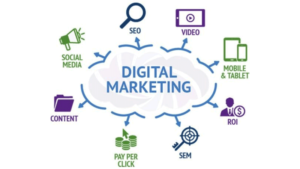Digital marketing is a dynamic and multifaceted field that involves promoting products, services, or brands through various online channels. If you’re considering a career or involvement in digital marketing, understanding the typical daily life and responsibilities of a digital marketer can give you valuable insights. Here’s an overview of what life in digital marketing often entails:
1. Daily Responsibilities
Strategy Development:
- Planning Campaigns:Designing and planning digital marketing campaigns, including setting objectives, target audiences, and key performance indicators (KPIs).
- Market Research:Analyzing market trends, competitor strategies, and consumer behavior to inform marketing strategies.
Content Creation:
- Creating Content:Developing content for blogs, social media, websites, email newsletters, and ads. This may include writing, graphic design, video production, and more.
- Editing and Proofreading:Ensuring content is high-quality, engaging, and free from errors.
Campaign Management:
- Running Ads:Managing pay-per-click (PPC) campaigns, social media ads, and display ads across platforms like Google Ads, Facebook Ads, and LinkedIn Ads.
- Monitoring Performance:Using analytics tools to track the performance of digital campaigns, making adjustments as needed.
Engagement and Community Management:
- Social Media Interaction:Engaging with followers on social media platforms, responding to comments, and managing online communities.
- Customer Support:Addressing customer inquiries and issues that arise through digital channels.
Analytics and Reporting:
- Data Analysis:Analyzing traffic, conversion rates, and other metrics using tools like Google Analytics, HubSpot, or SEMrush.
- Reporting:Creating reports to present insights and results to stakeholders, often including recommendations for optimization.
Collaboration and Meetings:
- Team Coordination:Collaborating with other team members such as designers, developers, and content creators.
- Client Meetings:Communicating with clients or stakeholders to discuss progress, strategies, and outcomes.

2. Skills Required
- Technical Skills: Proficiency in tools and platforms such as Google Analytics, Google Ads, SEO tools, and social media management platforms.
- Creativity:Ability to create engaging content and innovative marketing campaigns.
- Analytical Skills:Capability to interpret data and derive actionable insights.
- Communication Skills:Strong writing and verbal communication skills for content creation and client interactions.
- Project Management: Organizational skills to manage multiple campaigns and projects simultaneously.
3. Tools and Platforms
- Analytics: Google Analytics, HubSpot, Hotjar.
- SEO:Moz, Ahrefs, SEMrush.
- Social Media Management:Hootsuite, Buffer, Sprout Social.
- Email Marketing:Mailchimp, SendGrid, Constant Contact.
- Design and Content Creation:Adobe Creative Suite, Canva, WordPress.
4. Trends and Challenges
Staying Updated:
- Continuous Learning:Digital marketing is constantly evolving with new tools, technologies, and trends. Marketers need to stay updated through webinars, courses, and industry news.
- Adaptability: Adapting strategies to changes in algorithms, consumer behavior, and market conditions.
Balancing Workloads:
- Managing Deadlines: Balancing multiple campaigns, deadlines, and priorities can be demanding.
- Performance Pressure: Meeting KPIs and demonstrating return on investment (ROI) can be a significant part of the job.
5. Career Paths and Growth
- Specializations: Roles such as SEO Specialist, Content Marketer, Social Media Manager, PPC Specialist, and Digital Marketing Manager.
- Advancement: Opportunities for career advancement into roles like Director of Digital Marketing, Chief Marketing Officer (CMO), or starting your own digital marketing agency.
6. Work Environment
- Variety:Digital marketing professionals may work in diverse environments including corporate offices, agencies, or remotely.
- Collaboration: Frequent interaction with teams, clients, and stakeholders.
Summary
A career in digital marketing involves a mix of strategic planning, creative content creation, data analysis, and ongoing learning. It offers dynamic challenges and opportunities for growth, making it an exciting field for those interested in the intersection of technology and communication. http://lwadfocus.com

